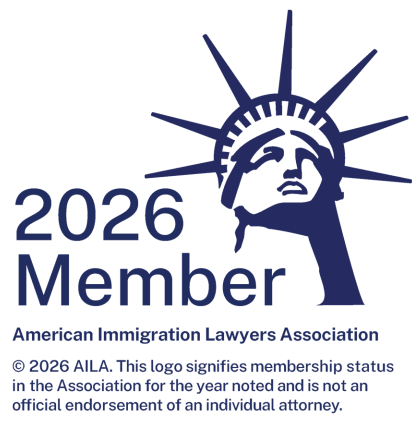RECENT ARTICLES
LEGAL SERVICES
By: Jennifer Fabian-Verzosa, Esq.
IN A SIGNIFICANT POLICY REVERSAL, USCIS ANNOUNCED MAJOR CHANGES IN EARLY 2025 REGARDING HOW GENDER IS RECOGNIZED AND LISTED ON IMMIGRATION FORMS AND DOCUMENTS. READ ON FOR MORE ABOUT WHAT YOU NEED TO KNOW ABOUT THIS IMPORTANT UPDATE.

1. Return to a Two-Sex Policy: Male and Female Only
Effective April 2, 2025, USCIS updated its policy manual to state that it only recognizes two biological sexes: male and female. This change was implemented to align with the January 20, 2025, Executive Order "Defending Women From Gender Ideology Extremism and Restoring Biological Truth to the Federal Government."
2. The "X" Gender Marker is Eliminated
The "X" gender option (sometimes listed as "Another Gender Identity"), which USCIS began adding to some forms like the N-400 Application for Naturalization in 2024 to provide a choice beyond male or female, has been removed.
- No More "X" on New Forms: Updated editions of forms are being released with only "Male" or "Female" options offered.
- "X" on Existing Forms will not be recognized: Even if you encounter an older form version that still shows an "X" or "Another Gender Identity" option, USCIS will not issue documents with an "X" marker based on this new policy.
- No New "X" Documents will be issued: USCIS will no longer issue any documents (like Green Cards, Employment Authorization Documents, or Naturalization Certificates) with an "X" gender marker.
3. How Sex is Determined: Back to Birth Certificate Rules
Under the new guidance, USCIS will primarily determine an individual's sex based on what is listed on their birth certificate issued at or nearest to the time of birth.
- Secondary Evidence: If the birth certificate lists something other than "Male" or "Female," or in limited circumstances where USCIS deems it more appropriate, the agency may consider secondary evidence (like other government IDs or medical records) to assign either a "Male" or "Female" designation.
- Self-Selection Overridden: The previous policy from March 2023, which allowed applicants to self-select their gender without supporting documentation matching their identity documents, has been superseded. The determination is now primarily based on the birth certificate record according to USCIS interpretation.
4. What About Existing Documents?
- Validity: Existing USCIS documents and U.S. Passports that already have an M, F, or X gender marker generally remain valid until they expire.
- Renewals: Renewing documents may be problematic. USCIS and the Department of State (which has implemented similar changes for passports) may revert the gender marker upon renewal to align with the sex listed on the birth certificate, regardless of the marker on the expiring document. It is unclear exactly how this will be implemented in all cases. Renewing a document with an "X" marker will likely result in it being reissued with either "M" or "F".
5. Impact on Applicants
This policy shift creates significant challenges:
- Difficult Choices: Non-binary, intersex, and transgender individuals whose identity doesn't align with the sex listed on their birth certificate may be forced to select "Male" or "Female" on forms, which may not reflect their identity.
- Potential Delays and RFEs: Selecting a sex different from the birth certificate, or failing to select one, could lead to processing delays or Requests for Evidence (RFEs) while USCIS determines the appropriate marker based on its policy. USCIS has stated it will not deny an application solely for failure to properly indicate sex, but processing issues are likely.
- Assigned Markers: USCIS may issue a document with a sex marker (M or F) that differs from what the applicant selected, based on its review of the birth certificate. USCIS intends to notify applicants if this occurs.
- Confusion and Distress: This policy can cause significant distress and confusion for applicants forced to use documentation that misrepresents their identity. It raises particular concerns for those seeking immigration benefits based on persecution related to their gender identity.
- Going Backward: These changes step back from previous USCIS efforts towards inclusivity, and directly impacts transgender, non-binary, and intersex applicants.
6. What Can Applicants Do?
Navigating this new landscape can be difficult. Consider these steps:
- Consistency (Where Possible): Aim for consistency between the gender marker selected on the USCIS form and other legal documents, particularly your birth certificate, to potentially minimize delays, while acknowledging this may not align with your identity.
- Be Prepared to Explain: If forced to select a marker inconsistent with your identity, be prepared to potentially explain this during the application process, possibly through a personal declaration if relevant to your case (e.g., asylum claims).
- Stay Informed: Keep track of updates from USCIS and immigration advocacy groups.
- Consult an Immigration Attorney: Seek legal advice, especially if your gender identity does not align with the M/F binary or the sex listed on your birth certificate, or if you have documents with conflicting markers. An attorney can provide advice tailored to your specific situation.

Navigating this new landscape can be difficult. Stay informed and keep track of updates from USCIS and immigration advocacy groups.
The April 2025 USCIS policy change marks a significant departure from previous trends towards gender inclusivity in the U.S. immigration system. It reverts to a strict male/female binary primarily defined by birth certificates, eliminating the "X" gender option and creating new hurdles for many applicants. Understanding this policy and getting help if you have questions is crucial for navigating the changes in the immigration process moving forward.
Our IMMIGRATION LAW OFFICE is here to help applicants navigate the immigration process. Our client-centered law office will be here for you every step of the way. We provide both in-person and remote immigration legal services, nationwide and worldwide. Contact us today!
________________
*For Article Requests, Republications, or Speaking Engagements, please email: jennifer@law-jf.com







